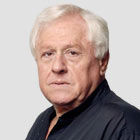The web encourages lies and deceit.
On the whole, I can't complain too much about the readers who respond to my column online. The great majority present their argument in more or less temperate terms. Most of them take issue with my point of view, which is how it should be. Many support their case with helpful and relevant information. So far, so civilised - the correct use of a blog. A minority express their opposition by way of abuse, very personal remarks and hysterical ranting, but I've had it far easier than many of my colleagues. I seriously considered suing one commenter for libel; I would have won, and English law, for purposes of libel litigation, allows the real identity behind an online pseudonym to be discovered.
It is that anonymity that's at the hub of a debate and vote that takes place in the European Parliament tomorrow. An Estonian MEP, Marianne Mikko, is worried that a growing number of blogs are written with "malicious intentions or hidden agendas". She proposes that bloggers identify themselves and declare any interests they have in the issue they're writing about. Her concerns should be taken seriously. We, the readers of blogs, do not, and normally cannot, know who lurks behind the funny nickname. We need more information about the writers so that we can decide how seriously to take their opinions. Has she a personal stake in whatever it is under discussion? Does he belong to a dodgy or extreme campaigning body? Is she the sister of the owner of the restaurant she's recommending? Does he bear a personal grudge? We don't know.
Coincidentally, last week, Sir Tim Berners-Lee, creator of the world wide web, confessed to his own worries about the way his invention was being used to dispense disinformation, conspiracy theories (that 9/11 was the work of the US government, for example) and harmful ideas. He particularly mentioned the spreading of the rumours that the MMR vaccine risked leading to autism in children. Also, he said, "the thinking of cults can spread very rapidly and suddenly a cult which was 12 people who had some deep personal issues suddenly finds a formula which is very believable ... which you can imagine spreading to thousands of people and being deeply damaging." His solution - systems that would give a website a label of trustworthiness once it had proved the reliability of its sources - was less convincing.
For the moment, the advantages of allowing virtually unrestricted access to the net outweigh the undoubted negatives mentioned by Mikko and Berners-Lee. But what's also clear is that more and more participants are abusing that freedom, whether as bloggers or on websites. We may soon have to consider devising controls on entry, though what form they'll take is not easy to envisage. It is possible that we will find out, in five or 10 or 20 years, that, in the internet, we have created a monster we cannot tame, whose capacity for doing harm exceeds any good it once brought.
Listening to the BBC World Service news bulletin the other night I was told that a sheet of music written by "the composer Mozart" had been discovered in a library in France. This upset me for a quite a while. Did they really need to tell listeners that Mozart was a composer? (The serious press here and the BBC home channels didn't.) Would there be anyone so ignorant of Mozart's calling as to require an explanation? I gave the World Service the benefit of the doubt. After all, a large proportion of its listenership comes from countries not steeped in the European classical music tradition. Still, its listeners are intelligent and knowledgeable - they have chosen to tune in to one of the highest-quality stations in the world - and I would have thought that, for them, the greatest of the great, whether in history or still living, and in whatever field of endeavour they exhibited their supremacy, would require no descriptive noun.
There are not all that many in that category: Mozart and Beethoven, Mandela, Einstein, Muhammad Ali, Shakespeare, perhaps a few more. It may be that the World Service has noticed a trend, veering towards greater ignorance, and is right to label even Mozart. Such a trend may be universal. I'm depressingly conscious that, as surveys continue to show, British youth's knowledge of important historical events and characters is abysmal; if they have so little idea who Winston Churchill was, can we expect them to know Mozart? And why should the youth of other countries fare better? Perhaps, quite soon, references in the serious media to all the great figures will have to be explained.
At least the World Service didn't describe him as the "famous composer Mozart". When I worked for the Times some years ago, it was forbidden to describe someone as the "famous" (or "celebrated" or "well-known"
This week Marcel saw the musical Zorro, based on the fictional adventure of the black-caped and masked do-gooder of Spanish California: "A beguiling mix of terrific flamenco dancing and singing, the Gipsy Kings' music and exuberant action." He watched all of Thabo Mbeki's resignation speech: "With sadness. He should have done so much more for his country."
Change settings via the Web (Yahoo! ID required)
Change settings via email: Switch delivery to Daily Digest | Switch format to Traditional
Visit Your Group | Yahoo! Groups Terms of Use | Unsubscribe
__,_._,___



